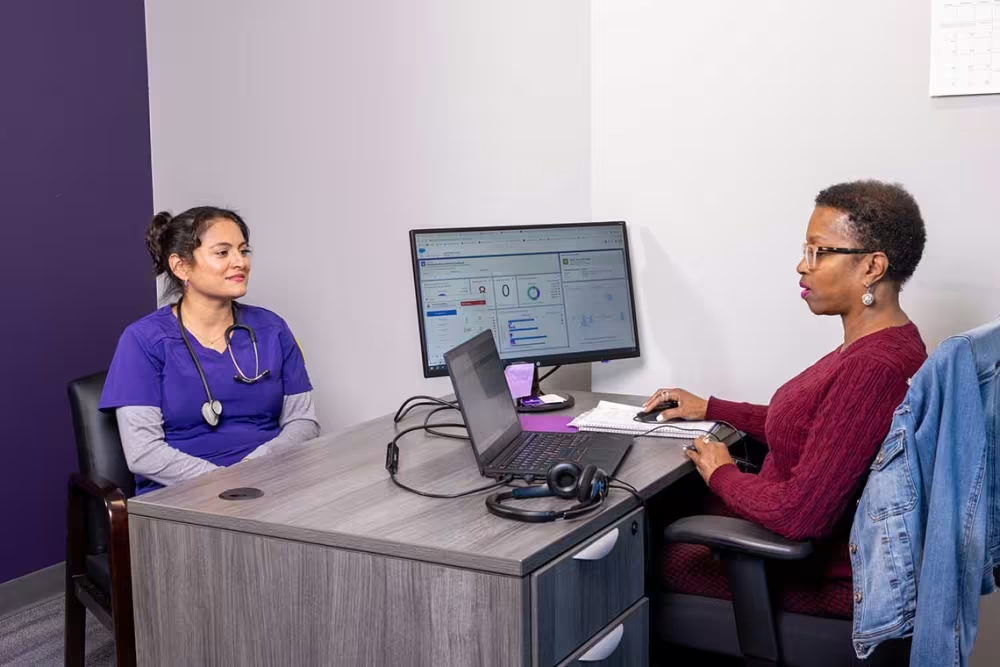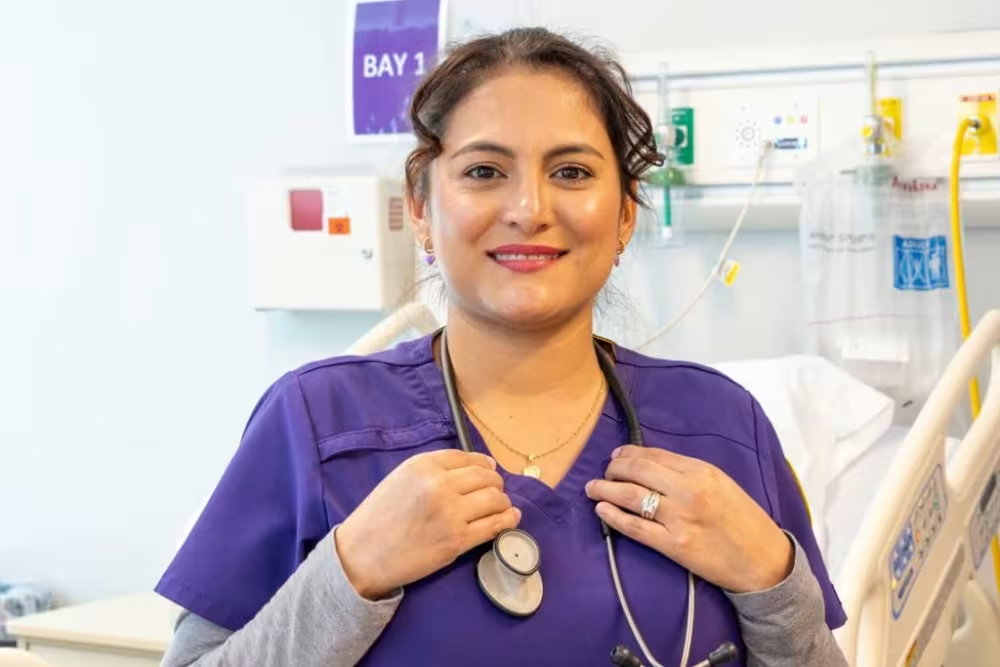Nursing School Questions: What to Ask Before You Apply
Each blog post is dated and contains accurate information as of that date. Certain information may have changed since the blog post publication date. If you would like to confirm the current accuracy of blog information, please visit our ABSN overview page or contact admissions at (866) 891-1371.
There are many questions about nursing you should ask before making a career change or transferring to a nursing school. Consider asking nursing school questions like, “How long does it take to become a nurse?” and “What is the admissions process like?”

Unless you have a background in healthcare, such as emergency medical services (EMS), entering the nursing field might seem confusing. How long does it take to become a nurse? What sort of nursing program should you look for, and what is the admissions process like?
These and other nursing school questions are likely to arise as you consider your future. At Concordia University Texas, our admissions counselors guide prospective nursing students through each step of the process and answer all questions. You’ll know exactly what you can expect, and you’ll be able to turn to your dedicated counselor for guidance along the way.
Concordia University Texas’s Accelerated Bachelor of Science in Nursing (ABSN) track is designed specifically to meet the needs of both transfer students and established professionals interested in switching careers to nursing. In the ABSN track, you could graduate in as few as 16 months after completing prerequisites.
As you prepare to take the first step toward becoming a nursing student, it’s helpful to jot down a list of questions to ask about nursing programs. Some of the questions you might want to ask include:
- How does the admissions process work?
- Do I need to take prerequisites?
- What can I expect from nursing school?
Why Should You Ask Questions About Nursing?
Asking your admissions counselor questions about nursing school does more than provide clarity. It also demonstrates your genuine interest in becoming a nurse.
At any school, admissions teams strive to admit students who are committed to mastering nursing skills and launching a career in nursing. Nursing school can be challenging. When students are committed to their nursing career goals, they are more likely to persevere.
Additionally, asking questions can help you prepare for nursing school. Knowing what to expect ahead of time will help you plan your schedule and shift your current responsibilities to accommodate your school schedule.

Top Nursing School Questions to Ask
While you’re preparing to reach out to an admissions counselor, consider adding the following to your own list of nursing school questions.
1. How Long Does It Take to Become a Nurse?
The length of time it takes to become a nurse depends on your starting point and your choice of nursing school track. Traditional nursing tracks typically take four years to complete, as they include general education courses.
If you are eligible to apply to Concordia University Texas’s ABSN track, you can graduate in as few as 16 months. This timeline assumes that you have completed the prerequisites ahead of time. Our ABSN track also offers three start dates per year, allowing students to enroll more quickly.
After graduating, you’ll need to pass the NCLEX-RN before becoming a nurse. Assuming you pass on your first attempt, this will generally add a couple of months to your timeline.
2. Am I Eligible for the Accelerated Nursing Track?
Every nursing school establishes its own admission requirements. If you have a minimum of 60 non-nursing college credits or a non-nursing bachelor’s degree, you may be eligible for the ABSN track at Concordia University Texas. You’ll also need a cumulative GPA of 3.0 and a cumulative natural science GPA of 3.0.

Learn how to become a nurse with a non-nursing bachelor’s degree.
3. Do I Need to Take Prerequisites?
If you’re planning on applying to an accelerated BSN program, you’ll likely need to fulfill prerequisites. The number you’ll need to complete depends on the program and your prior education, as your preexisting credits might already fulfill some of these requirements.
At Concordia Texas, your ABSN track admissions counselor will review your unofficial transcripts to determine which prerequisite courses you will need to take.
4. How Does the Nursing School Admissions Process Work?
The nursing school admissions process at Concordia University Texas is designed to be as stress-free as possible, thanks to the commitment of our admissions counselors. They’re committed to helping you throughout the admissions process and answering your questions about nursing.
The steps in the admissions process include:
- Reach out to an admissions counselor and schedule an admissions call.
- Make a plan with your admissions counselor to fulfill requirements, including prerequisites, ahead of your intended start date.
- Complete the admissions requirements and complete prerequisite courses.
- Submit a nursing school application, including an online application and supplemental documents like your official transcripts.
5. If I Want to Become a Nurse, Why Should I Earn a BSN?
While it’s possible to become a nurse with an associate degree, earning a BSN unlocks a world of possibilities. You’ll enjoy benefits such as:
- Ability to contribute to better patient outcomes
- Ability to pursue graduate-level nursing education
- Capacity to step into leadership roles within healthcare
- Potential for career advancement
Earning your BSN degree from Concordia University Texas allows you to develop the critical thinking, leadership, and communication skills needed in today’s complex healthcare landscape.
In fact, hospital professionals seek out BSN-prepared nurses because they are better prepared to provide excellent patient care.
Studies have shown that hospitals with a higher percentage of nurses with baccalaureate degrees have better patient outcomes.
If you’re still wondering if you should get a BSN, consider 11 reasons getting a BSN is so important.

6. What Does the ABSN Curriculum Consist Of?
Concordia University Texas’s blended learning model integrates online coursework, hands-on labs, and clinical practice at top healthcare facilities in and around Dallas and Austin.
Online coursework brings convenience to the learning process. It allows you to create your own schedule and learn core nursing concepts at any time, provided you meet deadlines and attend in-person proctored exams. Participate in interactive activities and online discussion boards, and review course materials as many times as needed.
Hands-on labs offer a realistic learning environment to learn core nursing skills without the risk of practicing on actual patients. Faculty will support you each step of the way and observe how well you apply nursing theory, reasoning, and practice in real-time clinical simulations.
Clinical rotations go together with online coursework and hands-on labs. A critical part of your education, clinicals give you the opportunity to deliver real patient care for the first time while under close supervision. Clinicals will teach you how to meet the highest standards of patient care and how to quickly apply critical thinking skills.
7. How Do Nursing School Clinical Rotations Work?
Clinical rotations introduce you to diverse patient care settings, including medical-surgical, pediatrics, obstetrics, intensive care, and mental health. During these rotations, you’ll learn as you work, progressively taking on more responsibility for patient care as you progress in your education.
Clinical experiences will develop your patient care skills and help you determine which nursing specialty you would like to pursue. Clinicals are also prime networking opportunities for future nurses.

How to Choose the Right Nursing School
Choosing a nursing school is a very important decision. You would want to choose a school that is accredited, offers diverse clinical experiences, and has high NCLEX-RN pass rates. Other considerations when choosing a nursing school include:
- How supportive the nursing instructors are
- Whether nursing instructors for online classes are accessible
- If specialized support is available, such as Academic Success Coaches
- Where the school is located
Start Your Nursing Journey at Concordia University Texas
Concordia University Texas’s accredited ABSN track graduates compassionate, competent students who are prepared to take the NCLEX-RN with confidence and go on to provide quality patient care while navigating complex modern challenges in healthcare. Our nursing school offers extensive support to our students, including attentive faculty and Academic Success Coaches.
Contact an admissions counselor today with your nursing school questions.
